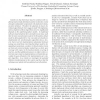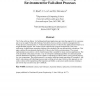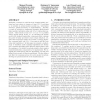46 search results - page 6 / 10 » Practical byzantine fault tolerance and proactive recovery |
DSD
2008
IEEE
14 years 1 months ago
2008
IEEE
Systems on chip (SoC) have much in common with traditional (networked) distributed systems in that they consist of largely independent components with dedicated communication inte...
SRDS
2007
IEEE
14 years 1 months ago
2007
IEEE
Fault tolerant distributed protocols typically utilize a homogeneous fault model, either fail-crash or fail-Byzantine, where all processors are assumed to fail in the same manner....
DSE
1998
13 years 7 months ago
1998
The Voltan software library for building distributed applications provides the support for (i) a processpair to act as single Voltan self-checking ‘fail-silent’ process; and (...
SAC
2010
ACM
14 years 2 months ago
2010
ACM
Byzantine consensus in asynchronous message-passing systems has been shown to require at least 3f + 1 processes to be solvable in several system models (e.g., with failure detecto...
OPODIS
2008
13 years 9 months ago
2008
Abstract. Consensus is a fundamental building block used to solve many practical problems that appear on reliable distributed systems. In spite of the fact that consensus is being ...



